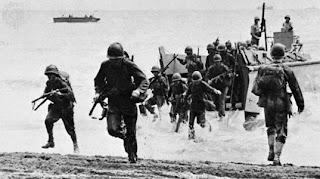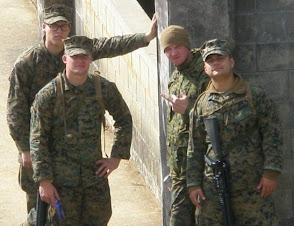In the last few years, Pearl Harbor Day has taken on increased significance to me personally, not just because my father and many of my uncles served in the armed forces during World War II, but also because most of the veterans of that war that I grew up knowing have passed from the scene. It was an extraordinary time: rendered more so by the fact that Pearl Harbor and the events that followed are as historically removed from the experiences of the present generation as the trauma of the Civil War was from those of my father's generation. That being said, I now view this day as a perfect excuse to invite my father and those of his surviving friends who lived through the often uncertain years of World War II to reminisce about their friends and experiences. Some of their stories I have heard over and over again, but some are surprisingly fresh and unexpected; this is why it strikes me as particularly poignant that before too much longer virtually all of these recollections — some funny, some touching, and some sad — will, like those who currently share them, be gone forever.
A Long Time Ago, on a Sunny Morning in Hawaii ...
 |
| Mrs. Beard lays a wreath on Pearl Harbor Day at the anchor of the USS Arizona |
As a direct result of these two Japanese attacks, eighteen U.S. ships including seven battleships were either sunk or so badly damaged that they would be out of action for months. In addition, of the nearly 400 military aircraft on the island, 188 were destroyed, and 159 were damaged. Total American casualties were 3,581, of which 2,403 were killed. The pillars of black smoke billowing up from the burning ships and airfields at Pearl Harbor after the Japanese air strikes bore witness to the stark fact that, although no formal declaration had yet been made by either nation, the United States and the Empire of Japan were now at war.
Remembering the "Day of Infamy" Seventy Years After
 |
| Pearl Harbor damaged battleships Arizona Tennessee and West Virginia |
 |
| USS Arizona Pearl Harbor Valor in the Pacific National Memorial |
In a very real sense, 7 December 1941, marked a major historical turning point for the United States because that date signaled the precise moment in time when a war that had already been raging in Europe for more than two years — suddenly took a circuitous and unexpected Pacific detour — and finally found its way to America's shores. Within a few days of the Pearl Harbor Raid, Adolph Hitler joined with his "Honorary Aryan" allies, the Empire of Japan, in its war against the hitherto neutral America. The United States, its people, and its institutions — spurred by this sudden, unexpected, but existential "two-ocean" war — embarked on a national project that, by the conflict's end in 1945, would leave the country transformed in virtually every way imaginable. As a direct result of the war, vast numbers of people would permanently relocate, sometimes moving great distances; new technologies, whole new industries, and breakthrough medicines and dramatic new medical therapies would be developed; women would enter the labor force as never before; and a generation of young veterans, who — before the war would never have considered continuing their educations past high school — would use the GI Bill for a college education; and finally, the United States, its territory largely untouched by the devastation that laid waste to much of Europe and Asia, would emerge from the war — thanks to its unrivalled industrial and agricultural productivity — as the dominant economic power in the post-war world. But all of the changes that ultimately resulted from America's entry into the war can really be seen as epilogue. In purely historical terms, the story of the United States both during and after World War II, like any narrative, must, along with its ending, also have a beginning. And when it comes to the story of America's participation in its "two ocean war", everything begins with the attack on Pearl Harbor: there, in the space of a few shattering minutes, the arc of the country's destiny changed forever; and, for better or for worse, the United States and its people were, after December 7, 1941, both set upon a path that would guarantee that neither of them would ever again be the same.
 |
| U.S. Marines landing on Guadacanal |
 |
| Pearl Harbor veterans share experiences at Wesley Bolin Plaza remembrance, Phoenix Arizona 2009 |









0 comments:
Post a Comment